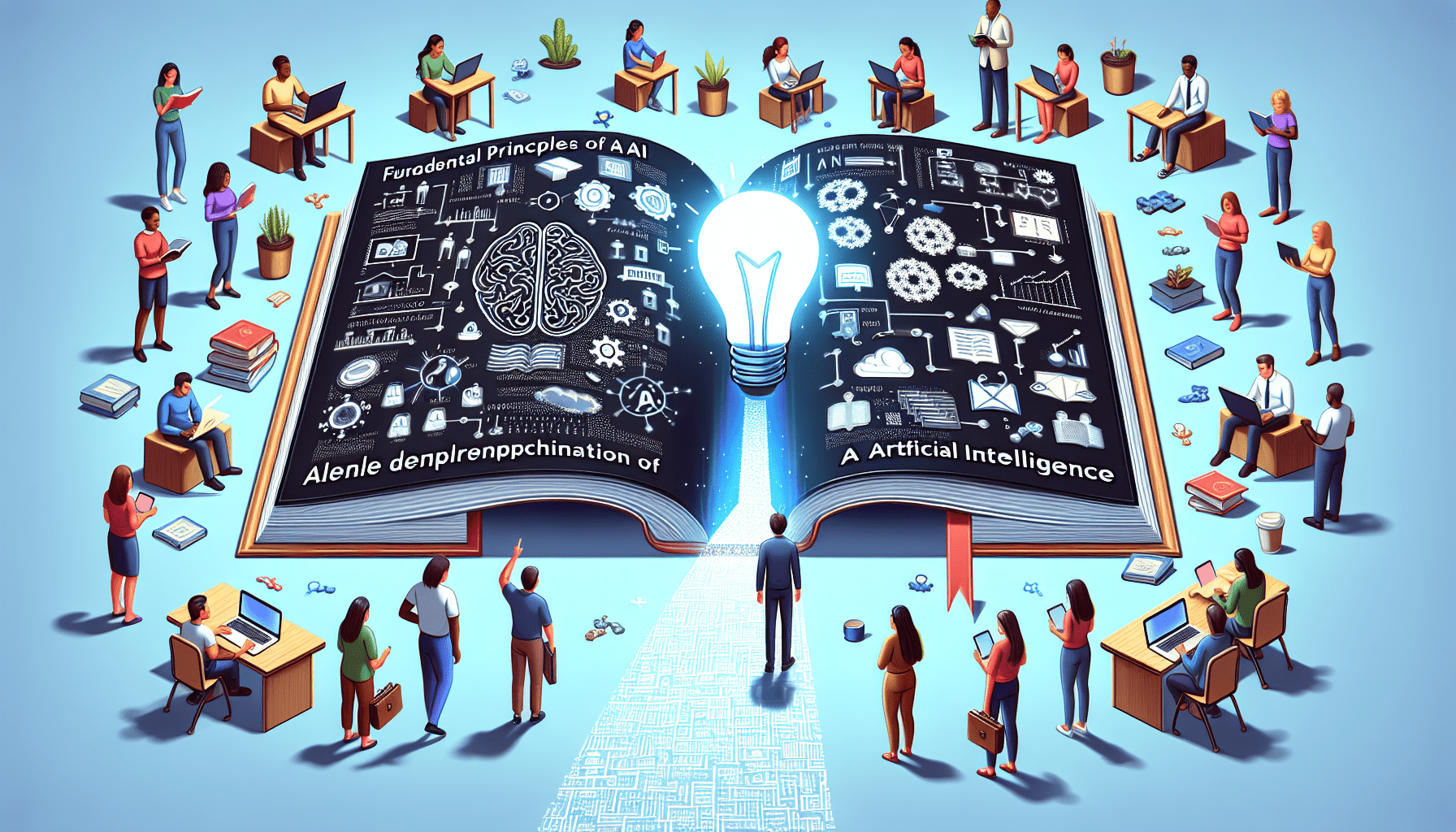If you’ve ever wondered how to learn AI without getting overwhelmed by complex theories and technical jargon, then you’re in luck. In this article, you’ll discover a straightforward and approachable method for understanding artificial intelligence. From breaking down key concepts to providing practical examples, this guide will show you that learning AI doesn’t have to be intimidating. So, let’s embark on this exciting journey together and uncover the easy way to grasp the fascinating world of AI.

Choose the Right Learning Resources
Online courses
When it comes to learning AI, online courses can be a valuable resource. There are numerous platforms that offer AI courses tailored to different skill levels, from beginner to advanced. These courses often provide in-depth knowledge and hands-on practice, allowing you to learn at your own pace. Look for courses that cover topics such as machine learning, neural networks, and programming languages commonly used in AI development.
Books
Books are timeless sources of knowledge and can provide a comprehensive understanding of AI concepts. Look for books written by experts in the field, as they can offer valuable insights and practical examples. From introductory guides to advanced textbooks, there are plenty of options available to suit your learning needs. Consider books that cover the fundamentals of AI, machine learning algorithms, and specific AI domains like computer vision or natural language processing.
Tutorials and guides
Tutorials and guides are excellent resources for beginners to get started with AI. Many online platforms offer free tutorials that cover various AI topics, ranging from basic concepts to advanced techniques. These tutorials often include step-by-step instructions and practical examples, making it easier for you to grasp the concepts and apply them in real-world scenarios. Keep an eye out for tutorials that focus on popular AI frameworks and libraries to enhance your hands-on experience.
Blogs and websites
Blogs and websites dedicated to AI can provide you with the latest updates, insights, and trends in the field. They often offer articles, case studies, and expert opinions that can broaden your understanding of AI and its applications. Following reputable AI blogs and websites will keep you informed about breakthroughs, emerging technologies, and upcoming events. Moreover, some blogs also offer tutorials, guides, and resources to further supplement your learning journey.
Start with the Basics
Understanding the fundamentals of AI
Before diving into the intricacies of AI, it’s essential to have a solid understanding of its fundamentals. Learn about the history of AI, its key concepts, and its subfields. Familiarize yourself with terms like machine learning, deep learning, and neural networks. By grasping the basics, you’ll be better equipped to tackle more advanced topics and build a strong foundation for your AI journey.
Learning about machine learning
Machine learning is a crucial aspect of AI and forms the backbone of many AI applications. Start by understanding the basic principles of machine learning, such as supervised learning, unsupervised learning, and reinforcement learning. Learn about different algorithms used in machine learning, including decision trees, support vector machines, and neural networks. Gain hands-on experience by implementing these algorithms on sample datasets.
Exploring neural networks
Neural networks play a significant role in AI, especially in deep learning applications. Dive deeper into the intricacies of neural networks, understanding their structure, activation functions, and training techniques. Experiment with building and training neural networks using popular frameworks like TensorFlow or PyTorch. By gaining a strong understanding of neural networks, you’ll be able to tackle complex AI problems and create advanced models.
Getting familiar with programming languages used in AI
Programming is a crucial skill in AI development. While there are several programming languages used in AI, Python is widely favored due to its simplicity and extensive libraries. Start by familiarizing yourself with Python and its libraries dedicated to AI, such as NumPy, Pandas, and Scikit-learn. Additionally, learning languages like R and Julia can also be beneficial, depending on the specific AI domain you wish to specialize in. Practice coding and implementing AI algorithms to strengthen your programming skills.
Hands-on Practice
Implementing AI algorithms and models
Theory alone is not enough; hands-on practice is crucial in mastering AI. Implement various AI algorithms, such as linear regression, clustering, and classification, on real-world datasets. Work on building predictive models and evaluating their performance. By gaining hands-on experience in implementing algorithms, you’ll develop a deeper understanding of their inner workings and improve your problem-solving skills.
Working on real-world AI projects
To apply your knowledge effectively, work on real-world AI projects. Identify potential AI applications in different domains, such as healthcare, finance, or transportation, and develop AI solutions to solve specific problems. This hands-on experience will help you navigate the challenges and complexities of real-world scenarios, allowing you to refine your skills and expand your portfolio.
Joining AI competitions and challenges
Participating in AI competitions and challenges can be an excellent way to sharpen your skills and gain recognition. Platforms like Kaggle host a wide range of AI competitions where you can compete with other AI enthusiasts and learn from their approaches. These competitions often provide datasets and problem statements, allowing you to test your abilities and explore innovative techniques. Collaborating with other participants and analyzing different solutions can greatly enhance your learning experience.
Experimenting with open-source AI frameworks and libraries
Open-source AI frameworks and libraries provide a wealth of resources and tools for AI development. Experiment with popular frameworks such as TensorFlow, PyTorch, and Keras to build and train AI models. Explore pre-trained models and transfer learning techniques to accelerate your AI development process. Contributing to open-source projects can also provide valuable hands-on experience and allow you to learn from the AI community.
Utilize Online AI Platforms and Tools
Cloud-based AI services
Cloud-based AI services offer accessible and scalable solutions for AI development. Platforms like Amazon Web Services (AWS), Google Cloud Platform (GCP), and Microsoft Azure provide AI services that allow you to develop, deploy, and scale AI applications without the need for extensive infrastructure. Utilize these platforms to leverage pre-built AI capabilities, such as image recognition, natural language processing, and recommendation systems.
AI development platforms
AI development platforms provide comprehensive environments for AI development and experimentation. Platforms like Jupyter Notebook, Anaconda, and Google Colab offer integrated development environments (IDEs) with powerful libraries and tools pre-installed. These platforms facilitate data exploration, model development, and visualization, making it easier for you to focus on the AI development process without worrying about the technical setup.
Data preprocessing and cleaning tools
Data preprocessing and cleaning are essential steps in AI development. Utilize tools such as Pandas, NumPy, and scikit-learn to preprocess and clean datasets, handle missing values, and normalize data. These tools provide functions and methods that streamline the data preparation process, allowing you to focus on building accurate and robust AI models.
Visualization tools for AI
Visualizing AI models and their outputs can enhance the understanding and communication of their results. Platforms like Matplotlib, Seaborn, and Tableau provide visualization capabilities to create meaningful charts, graphs, and interactive dashboards. Utilize these tools to visualize your data, model training progress, and evaluation metrics, creating insightful representations of AI outcomes.

Stay Updated with AI News and Events
Following AI-related blogs and news websites
To stay up-to-date with the latest advancements in AI, follow reputable AI blogs and news websites. This will ensure you are aware of emerging trends, breakthrough research, and industry updates. Some notable AI blogs and websites include AI News, Towards Data Science, Machine Learning Mastery, and the AI section of prominent technology news outlets like TechCrunch and Wired.
Attending AI conferences and workshops
AI conferences and workshops provide valuable opportunities to learn from experts, network with peers, and stay updated with the latest research and industry trends. Attend conferences like the International Conference on Machine Learning (ICML), NeurIPS, and AI Summit. Participate in workshops and tutorial sessions conducted by industry leaders, gaining insights into cutting-edge techniques and real-world applications.
Joining AI communities and forums
Engaging with AI communities and forums can broaden your knowledge and provide a platform for discussions and knowledge sharing. Join online communities like Reddit’s r/MachineLearning, LinkedIn AI groups, and AI-focused forums. Participate in discussions, seek advice from experienced practitioners, and contribute to the community by sharing your own learnings and insights. Collaborating with like-minded individuals will help you stay motivated and foster continuous learning.
Exploring AI research papers and publications
Delve into AI research papers and publications to gain a deeper understanding of complex AI concepts and algorithms. Platforms like arXiv, IEEE Xplore, and Google Scholar host a vast collection of research papers across various AI domains. Read papers published by leading researchers and institutions to keep up with the latest advancements, methodologies, and theoretical foundations in AI.
Collaborate and Learn with Others
Joining study groups or online forums
Learning AI alongside others can be highly beneficial. Join study groups or online forums where you can collaborate with peers, discuss challenging concepts, and solve problems together. Participate in group projects and share your learnings and insights. By working together, you can leverage collective knowledge, gain new perspectives, and accelerate your learning progress.
Participating in AI meetups and hackathons
AI meetups and hackathons provide opportunities to connect with AI enthusiasts and industry professionals in person. Attend local AI meetups organized by AI communities or join hackathons that focus on AI development. These events often involve hands-on activities, presentations by experts, and networking opportunities. Engage with fellow participants, share ideas, and learn from their experiences to further enhance your AI journey.
Engaging in discussions with AI experts
Seek opportunities to engage in discussions with AI experts to gain insights and guidance. Attend guest lectures, webinars, or panel discussions featuring renowned AI researchers and practitioners. Ask questions, seek advice, and learn from their experiences in applying AI in real-world scenarios. Connecting with experts in the field can provide valuable mentorship and open doors to new opportunities.
Contributing to open-source AI projects
Contributing to open-source AI projects is an excellent way to enhance your skills while making a meaningful impact. Choose projects aligned with your interests and skill level and actively contribute to their development. Collaborate with the project’s community, submit bug fixes or enhancements, and learn from code reviews. Open-source projects offer a collaborative environment where you can learn from experienced developers and gain practical experience in AI development.

Specialize in a Specific AI Domain
Computer vision
If you have an interest in understanding and interpreting visual data, specializing in computer vision can be a rewarding path. Computer vision focuses on teaching machines to perceive and interpret visual information, enabling applications such as image recognition, object detection, and facial recognition. Dive deep into algorithms like Convolutional Neural Networks (CNNs), and explore frameworks like OpenCV and TensorFlow’s Object Detection API to develop computer vision applications.
Natural language processing
Specializing in natural language processing (NLP) involves working with AI algorithms that analyze and process human language data. NLP enables applications like language translation, sentiment analysis, and chatbot development. Learn about techniques such as text classification, named entity recognition, and language generation. Familiarize yourself with libraries like NLTK, spaCy, and TensorFlow’s NLP toolkit to build powerful NLP models.
Deep learning
Deep learning is a subset of machine learning that focuses on training neural networks with multiple layers to learn complex patterns and representations. Specializing in deep learning involves mastering advanced neural network architectures like recurrent neural networks (RNNs), long short-term memory (LSTM), and transformers. Dive deeper into frameworks like PyTorch and TensorFlow to develop and train cutting-edge deep learning models used in applications like speech recognition and image generation.
Reinforcement learning
Reinforcement learning involves training AI agents to learn from interactions with an environment to maximize rewards. Specializing in reinforcement learning requires understanding concepts like Markov Decision Processes (MDPs), Q-Learning, and policy gradients. Explore reinforcement learning libraries like OpenAI Gym, Stable Baselines, or Ray’s RLlib to build and train AI agents capable of making optimal decisions in dynamic and uncertain environments.
Apply AI in Real-World Scenarios
Identifying potential AI applications
Once you’ve acquired foundational knowledge and specialized in a specific AI domain, it’s crucial to identify potential AI applications in real-world scenarios. Analyze various industries, such as healthcare, finance, or transportation, and determine how AI can address specific challenges or improve existing processes. Understanding the practical applications of AI will help you tailor your skills and solutions to industry-specific needs.
Working on AI projects in industry
Collaborating with industry professionals and organizations can provide invaluable hands-on experience in applying AI. Seek internships or job opportunities in companies that work on AI projects. This will allow you to work on real-world challenges, apply your skills in a professional environment, and learn from experienced mentors. Additionally, industry projects provide exposure to the complexities and ethical considerations involved in implementing AI solutions.
Building AI prototypes and demos
Building AI prototypes and demos is an effective way to showcase your skills and ideas. Identify a problem or concept that can be resolved or demonstrated using AI. Build a functioning prototype or demo using your AI knowledge and tools. This hands-on experience will not only enhance your technical skills but also demonstrate your ability to create innovative AI solutions.
Understanding ethical and responsible AI implementation
As AI continues to advance, it is crucial to consider ethical and responsible AI implementation. Understand the impact of AI on privacy, bias, and fairness. Familiarize yourself with ethical guidelines and practices in AI development. Stay updated with policies and regulations pertaining to AI, such as the General Data Protection Regulation (GDPR) and fairness guidelines from organizations like OpenAI and Google. Emphasize responsible AI implementation to ensure the ethical and inclusive use of AI technologies.

Learn from Case Studies and Success Stories
Analyzing successful AI implementations
Analyzing successful AI implementations can provide valuable insights into best practices and techniques used by industry leaders. Study case studies of successful AI applications in various domains, such as healthcare diagnostics, autonomous vehicles, or fraud detection. Understand the challenges faced, the strategies employed, and the impact achieved. Evaluating these success stories will broaden your understanding of effective AI implementation strategies.
Examining AI failures and challenges
Learning from AI failures and challenges is equally important to avoid potential pitfalls and mistakes. Analyze case studies of AI projects that did not succeed as expected. Identify common pitfalls and challenges, such as insufficient data quality, unrealistic expectations, or inadequate model evaluation. By understanding the potential challenges and limitations of AI, you’ll be better prepared to overcome obstacles in your own projects.
Reading case studies in various domains
Expand your knowledge by reading case studies in various domains where AI has been successfully implemented. Look for case studies in fields such as finance, healthcare, retail, or manufacturing. These case studies provide practical insights into how AI has transformed industries and offer inspiration for your own AI projects. Analyze the methodologies and approaches to gain a comprehensive understanding of domain-specific AI applications.
Understanding the impact of AI on society and businesses
AI has a significant impact on society and businesses, and it’s essential to understand its implications. Explore research and publications that examine the societal, ethical, and economic effects of AI. Stay informed about AI’s role in automation, job displacement, and privacy concerns. By understanding the broader impact of AI, you can make informed decisions and contribute to responsible AI development.
Continuous Learning and Adaptation
Keeping up with AI advancements
AI is a rapidly evolving field, and it’s crucial to keep up with the latest advancements. Subscribe to newsletters, research portals, and AI publications to stay informed about new research papers, breakthroughs, and emerging techniques. Regularly explore AI-related news and blogs to stay up-to-date with the latest trends and innovations.
Exploring new AI techniques and algorithms
As AI continues to evolve, new techniques and algorithms are constantly being developed. Allocate time for exploring new AI approaches. Stay curious and experiment with cutting-edge techniques like generative adversarial networks (GANs), attention mechanisms, or transfer learning. By continuously exploring new AI techniques, you’ll enhance your skills and keep pace with the ever-evolving field.
Updating skills and knowledge regularly
In the rapidly changing landscape of AI, continuous learning is essential. Participate in online courses, attend workshops, or pursue advanced degrees or certifications to update your skills and knowledge. Seek out industry-recognized certifications in AI to validate your expertise and stay competitive in the job market.
Embracing a growth mindset in AI learning
Approach AI learning with a growth mindset, embracing challenges and persisting through setbacks. Understand that learning AI is a journey, and mistakes and failures are opportunities for growth. Foster a mindset that values continuous improvement and embraces the iterative nature of AI development. With a growth mindset, you’ll be more open to learning from others, adapting to new techniques, and pushing the boundaries of your AI knowledge.
Learning AI the easy way requires a systematic approach combined with hands-on practice, continuous learning, and collaboration with others. By choosing the right learning resources, starting with the basics, utilizing online platforms and tools, staying updated with AI news and events, collaborating with others, specializing in a specific AI domain, applying AI in real-world scenarios, learning from case studies, and embracing continuous adaptation, you’ll be well on your way to mastering AI. So dive in with enthusiasm, and let your journey towards becoming an AI expert begin!







Leave a Reply